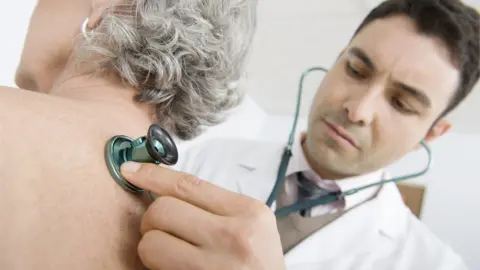Cancer backlog in England to be cleared 'by March 2022'
 Getty Images
Getty ImagesNHS England cancer chiefs say they intend to clear the backlog of patients waiting for cancer treatment caused by the pandemic by March 2022.
Of particular concern are the estimated 36,000 people who did not come forward for early diagnosis last year.
NHS bosses are working with GPs to ensure face-to-face appointments are being used to detect early cancers.
Cancer experts said access to better tests and faster diagnoses would help improve survival after cancer.
Dame Cally Palmer, national cancer director for NHS England, told a committee of MPs that during the Covid pandemic there had been "an issue of not wanting to bother the NHS or being concerned to come forward".
"It is important we have the diagnostic and treatment capacity to address that."
Large backlog
She said there had been a particular drop in people coming forward with lung cancer because of the crossover with Covid-19, and lung scans "had been accelerated".
And she said there had been significant investment in radiotherapy and diagnostic kit with cancer being "treated as a priority" next to backlogs for other operations to replace hips and knees, for example.
Although there had been a noticeable drop in people referred to cancer specialists during 2020, referrals and treatments have been above normal levels since March 2021, she added.
But there is still a large backlog of around 16,000 people currently waiting more than 62 days for a diagnosis, of whom about 12% will have cancer.
Dame Cally said she hoped this figure would return to pre-pandemic levels by spring next year.
Prof Peter Johnson, NHS England's national clinical director for cancer, said he was "cautiously optimistic" that by 2028, 75% of people with cancer would be diagnosed at an early stage (one or two).
This is one of the key cancer ambitions of the NHS in England.
He pointed to the use of FIT testing by GPs to measure levels of blood in people's stools as a quick way of working out who should be referred for a colonoscopy, which can detect bowel cancer.
But he acknowledged that during the pandemic a lot more communication with patients had been done on the phone and sometimes that meant "things were not done as they should have been".
NHS England says it is investing £20 million to speed up cancer diagnosis.
UK lagging years behind
Cancer survival rates are improving in the UK but they still lag behind those of many other countries.
John Butler, from the International Cancer Benchmarking Partnership, told MPs that the UK was still 10 to 15 years behind other leading nations on that measure.
He said delays to early diagnosis was one reason behind the difference, but even if cancers were picked up at the same stage, the UK was still inferior and that meant treatments were also a factor.
Former national cancer director Prof Sir Mike Richards agreed, saying the UK needed "better diagnostics" including machinery, equipment, facilities and workforce - and that GPs should have access to more and faster tests.
But he also said the UK had to find a way of encouraging people to visit their GP.
"Barriers are put up because of lack of capacity - equipment and staff," he said.
